
|
![]()
Greatest Films of the 1990s
1990 | 1991 | 1992 | 1993 | 1994 | 1995 | 1996 | 1997 | 1998 | 1999
Title Screen Film Genre(s), Title, Year, (Country), Length, Director, Description 


The Adventures of Priscilla: Queen of the Desert (1994, Australia/UK), 104 minutes, D: Stephan Elliott


Blue Sky (1994), 101 minutes, D: Tony Richardson
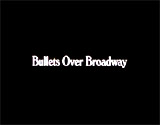

Bullets Over Broadway (1994), 98 minutes, D: Woody Allen
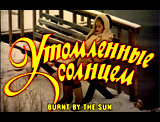

Burnt By the Sun (1994, Russia/Fr.) (aka Utomlyonnye solntsem, or Утомлённые солнцем), 135 minutes, D: Nikita Mikhalkov



Chungking Express (1994, HK) (aka Chung Hing sam lam), 98/102 minutes, D: Kar Wai Wong
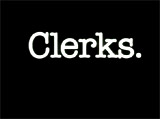

Clerks. (1994), 90 minutes, D: Kevin Smith
Writer/director Kevin Smith's amateurishly-acted, slapped-together low-budget (about $30,000) comedy - his first feature film - went into general release after its successes at film festivals, and became one of the most popular and successful comedy independent films of all time. The grainy, B/W film was a foul-mouthed, gloomy, Gen-X comedy with some outrageous laughs and memorable monologues about two ambition-less, minimum-wage clerks in dead-end jobs in two Leonardo Township, NJ stores next to each other in a strip mall. They were unproductive college drop-out and 22 year-old Quick Stop Groceries store clerk Dante Hicks (Brian O'Halloran) and his grungy, nihilistic, slacker, anti-social RST Video-store clerk friend Randal Graves (Jeff Anderson) who worked next door and clearly despised and abused his rental customers by often insulting or offending them. The film's tagline accurately described the main characters: "Just because they serve you doesn't mean they like you." In the film's opening, Dante's day started out badly with multiple problems - he was called early at home to work the morning shift beginning at 6 AM on his Saturday day-off when a co-worker was reported to be sick; when he arrived, he discovered that the metal shutters for the storefront were jammed closed by chewing gum stuffed into the lock. He left a make-shift message with big letters written in shoe polish on a large bed-sheet - I ASSURE YOU, WE'RE OPEN! Later, he learned that his boss who was to relieve him at noon had lied to take a vacation in Vermont - causing him to miss his 2 PM street hockey game. He kept reminding everyone: "I'm not even supposed to be here today." Scenes included hilarious dialogue about Dante's indecisiveness regarding two girlfriends (his slutty ex-high school sweetheart Caitlin Bree (Lisa Spoonauer) and his present devoted girlfriend Veronica Loughran (Marilyn Ghigliotti) who upset him when she described her previous active sex life - detailing 37 blow jobs), and Randal's memorable interactions with indecisive, confused, and irate customers (including his oblivious phone order of X-rated video titles while a Mom and young child stood close by waiting for the title "Happy Scrappy Hero Pup"). There was an impromptu hockey game on the rooftop, a visit to the wake-funeral of one of Dante's ex-girlfriends, and a lawsuit brought to Dante by a summons-server for selling cigarettes to a 4 year-old. Both workers engaged in constant, profanity-laced idle chatter and diverse discussions (especially memorable were their rambling debates on the Star Wars movies and the "personal politics" of contractors working on the second Death Star in the ending of Star Wars: Return of the Jedi (1983)). Loitering outside the store were local drug dealers Jay (Jason Mewes) and Silent Bob (director Kevin Smith).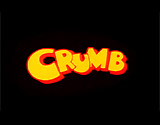

Crumb (1994), 119 minutes, D: Terry Zwigoff
Terry Zwigoff's intriguing R-rated biopic-documentary provided a bizarre yet fascinating portrait of the counter-cultural, sex-obsessed, underground comic book artist/writer Robert Crumb. It sympathetically portrayed the skinny, bespectacled, geeky cartoonist, a misanthrope (and ex-acidhead) best known for creating 1960s-era underground comic books. He rose to fame with the characters of Mr. Natural and nerdy Flakey Foont (often having sex with Amazonian women), the phrase: "Keep on Truckin'," Fritz the Cat drawings, and the cover art for rock queen Janis Joplin's best-selling LP record Cheap Thrills. Interviews with Crumb and dysfunctional members of his Catholic family, and other acquaintances and critics brought out diverse opinions about Crumb - was he just another pornographic fetishist, misogynist, and racist releasing his own repressed inner demons through art, or was he a brilliant and incisive critic who used satire to show contempt for pop culture, or both?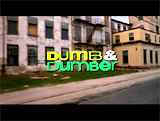
Dumb & Dumber (1994), 107/113 minutes, D: Peter Farrelly
Peter Farrelly's gross-out, un-PC, cross-country road-trip and buddy-comedy film was about two 'dumb' and clueless, "dumb & dumber" roommates and adventuring friends in Providence, RI. The two were introduced: chip-toothed and grinning limo driver Lloyd Christmas (Jim Carrey) with a bowl-style haircut, and Harry Dunne (Jeff Daniels), an entrepreneur running a mobile dog-grooming business ("Mutts Cutts") - he had customized and converted his 1984 Ford Econoline van into a "Poochmobile" (shaped like a sheepdog). During an airport delivery, Lloyd became entranced by one of his passengers - wealthy heiress Mary Swanson (Lauren Holly) who was on a trip to Aspen, CO. Strangely, Mary left her briefcase on the floor of the terminal, and appeared to be followed by two thugs: Joe "Mental" Mentalino (Mike Starr) and J. P. Shay (Karen Duffy). Lloyd raced inside and retrieved the case, and made an ill-fated attempt to return it to her. The two slacker roommates were both fired from their jobs, and decided to set out to return the briefcase by driving to Aspen, CO. Unbeknownst to them, they were being pursued by the two thuggish hit-men from the airport. The duo's demanding boss was revealed to be mastermind criminal Nicholas Andre (Charles Rocket) who lived in Aspen. There were many very funny misadventures for the two as they made their way to Aspen - in a truck stop, during an encounter with a motorcycle cop, the accidental poisoning of "hitchhiker" Mentolino who was trailing after them, and in further instances at meal or gas stops. Meanwhile in Aspen, Mary became concerned that the abductors, in an elaborate kidnapping and extortion scheme, had not received the ransom money intentionally left for them in a briefcase as instructed at the airport, in exchange for the return of her kidnapped husband Bobby (Brad Lockerman). She conferred with her parents and with old family friend and confidant Nicholas Andre, unaware that he had masterminded the kidnapping. To make matters worse, Lloyd had mistakenly took a wrong turn and detoured through Nebraska. Almost out of gas, Harry was exasperated with Lloyd's imbecility and he decided to desert him and walk home. Lloyd traded the van for a small mini-bike moped, caught up to Harry, and they decided to continue on to Aspen. Once there, they broke into the briefcase, saw the money, and went on a spending spree. They were able to meet up with Mary at a weekend Preservation Benefit (for Snow Owls) at Mary's home, and Harry was able to acquire a ski-date with her. Lloyd retaliated against Harry for his betrayal with Mary by putting a large dose of laxative in his coffee - leading to a hilarious sequence in Mary's bathroom. Lloyd arrived to tell dream-girl Mary that he had her briefcase, then took her to his luxury hotel to hand over the briefcase, and to foolishly confess his love to her. After mastermind Nicholas Andre (a longtime friend of the Swansons) discovered that the ransom money had been spent on luxury goods (and replaced with IOUs), he took Lloyd, Harry, and Mary hostage; they were rescued during a shootout by a group of trailing FBI agents. As a result, Nicholas and Shay were arrested and Mary was reunited with her husband Bobby. As the film concluded, the two broke and down-and out guys were walking along a deserted Colorado road, wondering to themselves: "When are we ever gonna catch a break?" - when unexpectedly, a bus group of bikinied females on tour representing Hawaiian Tropic stopped to ask if they would be their oil boys, but the two idiotic guys directed them elsewhere.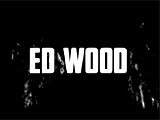


Ed Wood (1994), 124 minutes, D: Tim Burton



Exotica (1994), 103 minutes, D: Atom Egoyan
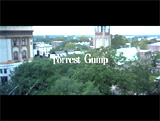


Forrest Gump (1994), 142 minutes, D: Robert Zemeckis
The winner of Best Picture, Best Director, Best Actor, and three more major Oscars. A sentimental tale of a slow-witted, low-IQ title character (Oscar-winning Tom Hanks) from the South who lived a full live surveyed from the 1950's through the 1980's. Remarkably, Gump witnessed the civil rights movement, the two 1960s assassinations of JFK and RFK, the moon landing, the Vietnam War, the hippie flower-children and anti-war protest, the Watergate scandal, the thawing of US/China relations, the beginning of the AIDs era, and more. In many cases, he was inserted into the historical footage - establishing a famous shrimping business (Bubba Gump's), meeting Presidents, playing ping-pong with Chinese team competitors, inventing the smiley logo, fighting in the war, and creating the jogging craze, etc. without realizing their significance. He fathered a son with childhood sweetheart Jenny (Robin Wright) and married her, but soon after, she died of a virus (HIV or Hepatitus C?).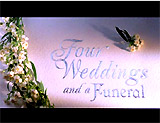



Four Weddings and a Funeral (1994, UK), 117 minutes, D: Mike Newell
Mike Newell's surprise R-rated British hit, a romantic comedy with explicit language and content, told about an on-again/off-again romance between a British bachelor and an American female - who often met at weddings (and one funeral). In the opening scene set in London, witty, bumbling but charming 32 year-old bachelor Charles (Hugh Grant) and his quirky, tone-deaf roommate Scarlett (Charlotte Coleman) realized that they had overslept and were late to a wedding - an habitual practice for both. The film's 'first' wedding was between Angus (Timothy Walker) and Laura (Sara Crowe), with Charles serving as best man (but he had forgotten the ring!). After the service in the church garden, Charles became intrigued when he was warned by his ascerbic, jealous, wealthy, long-time friend Fiona (Kristin Scott Thomas) about one of the attendees wearing a very wide-brimmed black hat - an American journalist and fashion editor named Caroline "Carrie" (Andie MacDowell). Afterwards, Charles changed his overnight plans and met up with the elusive, pretty and unique American Carrie in her Room 12 accommodations at The Lucky Boatman pub after she invited him there. The two slept together (an uncommitted, one night stand or tryst) - the first of similar encounters. The film's 'second' of four weddings was was officiated by nervous trainee-vicar Father Gerald; in the film's most hilarious sequence, the confused, inept, fumbling, malaprop-spouting Father Gerald mixed up the couples' names as he recited the vows for the "awful-wedded" marital couple, including saying "Holy Goat" and "Holy Spigot" instead of "Holy Ghost" or "Spirit." Charles became immediately depressed when Carrie introduced him to her older, snobbish Scottish fiancee Hamish Banks (Corin Redgrave). After her fiancee departed for Scotland, Carrie again asked Charles to join her for a night-cap in her hotel room, and they had sex a second time. A month later, however, Charles was invited to Carrie's wedding in Scotland. Opportunely, he helped Carrie shop for a wedding dress, and afterwards, Carrie recounted to him that he was her 32nd sexual partner, just one before Hamish. Charles also confessed his love to her referencing David Cassidy's song: "I Think I Love You," but it was already too late. During the film's "third" wedding ceremony in Scotland, Carrie and Hamish were married, but during toasts and dancing, the highly-energetic and gregarious Gareth (Simon Callow), one of the regular guests, collapsed to the floor from a lethal heart attack. In the film's sole funeral ceremony, Matthew (John Hannah) - Gareth's gay partner, offered memorable words of remembrance for the "jolly" and "splendid bugger." In the film's conclusion ten months later - the film's 'fourth' wedding, Charles had announced he was tying the knot with his troubled ex-girlfriend Henrietta (Anna Chancellor). Charles noticed Carrie was attending - and she informed him that she had separated from the older Hamish after a brief marriage of only a few months. They both realized that the timing was awful as he was about to approach the altar. As they were being wed and repeating their vows, Charles admitted, with help from his deaf younger brother David (David Bower) speaking in sign language, that Charles' love for Henrietta was in doubt and that he loved someone else. Charles' bride Henrietta punched him in the face to end the ceremony. The film ended with Carrie standing outside Charles' home in the rain to apologize for causing a disruption in Charles' marriage. He was finally able to declare his utter and true love for Carrie, although in a twist, he awkwardly did not ask for her hand in marriage. She agreed: "I do" as the film concluded.


Heavenly Creatures (1994, UK/Germ./NZ), 99 minutes, D: Peter Jackson
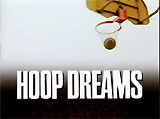



Hoop Dreams (1994), 171 minutes, D: Steve James
Steve James' exceptional high-school sports film was the most critically-acclaimed documentary of the 1990s, and also the all-time top-grossing documentary film (until Michael Moore's Bowling for Columbine (2002)). Conflict arose when it was not Oscar-nominated by AMPAS for Best Documentary Feature - causing changes to be made to the nominating procedure in future years. The inspirational, videotaped three-hour film detailed the six-year dramatic, uphill story of two hopeful teenaged, inner-city African-American basketball players (William Gates and Arthur Agee) in a suburb of Chicago, who had partial athletic scholarships at St. Joseph's HS - a predominantly white, Catholic school. They faced a constant struggle in their aspirations to be professional superstars in the NBA.



It Could Happen to You (1994), 101 minutes, D: Andrew Bergman
This contrived, dramatic Capra-esque romance was about "A cop. A waitress. A lottery ticket." - the film's tagline. Officer Charlie Lang (Nicolas Cage), a compassionate, generous, and virtuous New York City (Queens) cop, bought a lottery ticket (at the urging of his obnoxious, shrewish and shrill wife Muriel (Rosie Perez)), choosing the number 26 (instead of Muriel's suggestion of 27). During his lunch break at a coffee-shop/cafe with partner Bo Williams (William Pierce), Charlie realized that he didn't have cash to tip the friendly, hard-working, down-on-her-luck blonde waitress, Yvonne Biasi (Bridget Fonda). On a whim, he impetuously offered her 1/2 of his lottery winnings the next day - if he won. As luck would have it, Charlie won the lottery jackpot of $4 million. The next day at the restaurant, Charlie presented Yvonne with a voluntary choice between a double-tip or 1/2 the value of his ticket. She chose the ticket value (and he exclaimed: "A promise is a promise"), assuring herself of his gift of $2 million. The media publicized the lottery results at a press conference - announcing the bargain between Charlie, his reluctant wife, and the waitress. Yvonne was being harrassed by her estranged, sleazy, blackmailing, spend-thrift husband Eddie (Stanley Tucci) who suddenly appeared. Optimistic Charlie had told Muriel, "We should do the right thing," and that he was confident that they would still become rich and famous due to publicity and commercial endorsements. However, there were romantic and legal complications when the materialistic and greedy Muriel suspected Charlie of an affair with Yvonne, and threatened divorce. Muriel was represented by Harvey Hale (Richard Jenkins), while Charlie was defended by Walter Zakuto (Red Buttons). During the courtroom trial, Muriel's attorney demanded that the entire $4 million belonged to his client. Charlie would not agree to giving up Yvonne's share. Charlie testified that he and Yvonne were now in love, but had never met before the lottery ticket incident. The jury awarded Muriel the entire amount. Saddened by the verdict, Charlie and Yvonne visited the diner (which Yvonne had bought, but would now lose). Their hard-luck story and generosity, even in the face of disaster, was published by a undercover reporter/photographer named Angel Dupree (Isaac Hayes) (the film's narrator) who was posing as a hungry homeless man and was given food by the couple. In response, the generosity of New Yorkers brought in over $600K to help pay their debts, and they would soon marry. On the other hand, Muriel was swindled out of her money by her new husband, nouveau riche con man Jack Gross (Seymour Cassel).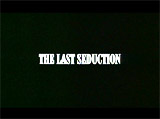




The Last Seduction (1994), 110 minutes, D. Robert Dahl


The Lion King (1994), 87 minutes, D: Disney Studio
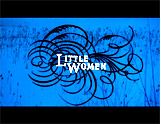

Little Women (1994, US/Can.), 115 minutes, D: Gillian Armstrong
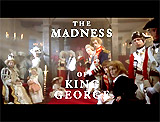




The Madness of King George (1994, UK), 107 minutes, D: Nicholas Hytner
Playwright Alan Bennett provided the screenplay derived from his own play The Madness of George III that had premiered in London in 1991. The fictionalized biographical-historical costume drama (with some 'comedy of manners' elements) from acclaimed Broadway director Nicholas Hytner (his motion picture debut) was literally about the insanity of politics. It was highlighted by George Fenton's selective musical score of G.F. Handel's classical music. The film received a well-deserved Academy Award for Best Art Direction. It told about the UK's King George (Sir Nigel Hawthorne) who served as the regal British monarch from 1760 to his death in 1820 at the age of 81, and was married to Princess and future Queen Charlotte (Helen Mirren) of Mecklenburg-Strelitz, with whom he had 15 children. The film mentioned how King George's 'madness' beginning in 1788 might have been the result of his loss of the North American colonies after the War of Independence (aka The Revolutionary War) from 1775-1783. He personally lamented the loss ("I've had no peace of mind since we lost America. Forests, old as the world itself, meadows, plains, strange delicate flowers, immense solitudes, and all nature new to art, all ours. Mine. Gone. A paradise lost"). A short description following the film described another possible medical cause of his lunacy and unstable "regal nonconformities," due to a bipolar psychological or mental condition known as porphyria - a metabolic blood disease that caused his urine to change color. In the early portion of the film, King George III exhibited strange, eccentric and bizarre behavior, including excessive talking and hyperactivity, frenzied sexuality, and failed memory. While in attendance at a bells-concert of "Greensleeves," he refused to let a pregnant woman sit during a reprised performance. He also roused his three sleepy servants at sunrise to go on a run with him in an open field, and at one point he was seen conversing with a tiny piglet. In particular, during a Handel musical concert, the misbehaving King George interrupted the musicians and ordered them to play louder, joined them on a harpsicord, and made improper bawdy sexual comments toward Lady Elizabeth Pembroke (Amanda Donohoe) and her shapely breasts: ("Fine cluster there, eh?") - his wife's Lady of the Bedchamber. His behavior exasperated his do-nothing son George, the Prince of Wales (Rupert Everett), and a newly-arrived personal equerry - Captain Greville (Rupert Graves). At the start of the film's palace intrigue, the Prince declared that his father was going mad, and separated him from his long-suffering and loving wife - the Queen (affectionately known as "Mrs. King"). The King's physician Dr. Warren (Geoffrey Palmer), loyal to the Prince, subjected the crazed King to painful heated cups applied to his body and the liberal use of laxatives, while his archaic, pseudo-quack Dr. Pepys (Cyril Shaps) focused almost solely on his piss-pot excretions. Another harsher and more unconventional physician, a parson-turned Dr. Francis Willis (Ian Holm), was summoned to treat the King's delusions using punishing methods to mold his patient's behavior and curb his foul outbursts by binding him to a chair and gagging him: ("If he does not strive every day and always towards his own recovery, then he must be restrained"). The King vehemently criticized his degrading treatment: ("I am the King. I tell, I am not told. I am the 'verb', sir, I am not the 'object'"). At one point, the King was humiliated in public by wearing a soiled diaper and nightclothes, as he fought a battle of wills against his oppressive doctor, who was allowed to directly look at him - breaking court etiquette. Political machinations of those surrounding him, including two political parties or factions in the British Parliament: the reorganized Whig Party led by radical Charles James Fox (Jim Carter) that advocated a Regency Bill to put the scheming Prince George in power, and the Tory party led by the King's cold Prime Minister William Pitt (Julian Wadham). To do so, Lord Chancellor Thurlow (John Wood) suppressed the record of the Prince's illegal marriage, but then he changed his mind and revoked the Regency Bill after attending an outdoor play reading of Shakespeare's King Lear with the ousted King George. He explained how he was very impressed by the monarch's improved physical condition ("Your Majesty seems more yourself"). He uncovered the hidden fact that young prince George had secretly married his Catholic mistress Mrs. Maria Fitzherbert (Caroline Harker) - a union that was declared invalid by his father, making him ineligible to succeed to the throne. In the film's conclusion, the restored and recovered King was again reusing his amusing spoken term: "What-what?" He and his royal family were greeted with great ceremonial pomp at St. Paul's Cathedral. King George III exhorted his son to act properly as part of their 'model family' - by waving at adoring crowds: "Smile at the people, wave at them. Let them see that we're happy. That's why we're here."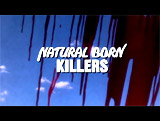




Natural Born Killers (1994), 120 minutes, D: Oliver Stone
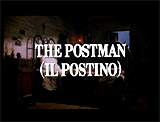


Il Postino: The Postman (1994, It./Fr./Belg.), 108 minutes, D: Michael Radford



The Professional (1994, Fr.) (aka Leon), 109 minutes, D: Luc Besson
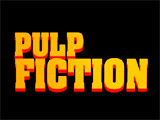


Pulp Fiction (1994), 153 minutes, D: Quentin Tarantino
A stylish, immensely-popular, violent, off-beat, modern B-movie cult classic from writer/director Tarantino - his second feature, about corruption and temptation. An interwoven series of three vignettes about low-life criminals, thugs, drug-dealers, hitmen, a washed-up crooked boxer, and restaurant-robbing lovers in the sleazy underworld of Los Angeles. Small-time hold-up artists - "Pumpkin" (Roth) and "Honey Bunny" (Plummer) - plotted a robbery in a restaurant. Meanwhile, philosophically-talkative hit men Jules Winfield (Jackson) and Vincent Vega (Travolta) carried out a hit for their vengeful, underworld boss Marsellus Wallace (Rhames) against double-crossing college-aged kids. Vincent entertained Marsellus' irresponsible wife Mia (Thurman) one evening - and then she overdosed on heroin. By not taking a dive, boxer Butch (Willis) scammed Marcellus during his last bout and planned to skip town. The two hitmen called on gangland cleanup specialist The Wolf (Keitel) when their jobs got messy.

Quiz Show (1994), 130 minutes, D: Robert Redford
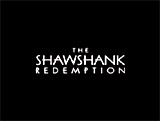

The Shawshank Redemption (1994), 142 minutes, D: Frank Darabont
This impressive and engrossing piece of film-making was the first feature film of director/screenwriter Frank Darabont, who had adapted King's 1982 novella Rita Hayworth and Shawshank Redemption (first published in Different Seasons). [Note: It was the first of three feature film adaptations of King's work by Darabont.] An uplifting, engrossing, life-affirming drama/prison tale about camaraderie was also a richly-detailed character study about the relationship between two jailed prisoners. Wrongly imprisoned for life in the Shawshank State Prison in the mid 1940s for murdering his adulterous wife and her lover, innocent banker Andy Dufresne (Tim Robbins) met another dignified lifer, kindly black Red (Morgan Freeman) known as a retriever who could procure contraband. The film was told from wise old Red's perspective (in ubiquitous calm voice-over, Freeman's quintessential narration). The evil, Bible-pounding Warden Norton (Bob Gunton) used Andy's financial background to cover his nefarious activities, and Red obtained a geological rock hammer and pinup of screen siren Rita Hayworth at Andy's request. The passage of time over two decades was conveyed by the pin-ups on Andy's cell wall, which changed from Hayworth to Marilyn Monroe, and then to Raquel Welch. Serving as an inspiration to the other convicts, Andy yearned for freedom and patiently planned for it. Red recollected about how he thought he had provided Andy with a harmless request - a rock hammer for his hobby. It proved to be their tool for emancipation, redemption, and ultimate salvation. Red internalized Andy's words by the film's closing: "Get busy livin', or get busy dyin'. That's god-damn right."



Speed (1994), 115 minutes, D: Jan De Bont
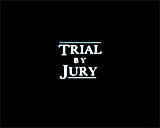



Trial By Jury (1994), 107 minutes, D: Heywood Gould
In this dramatic crime thriller about jury tampering, the tagline described one female juror's motivation to obey the convicted crime boss on trial: "To protect her child from the Mob, she did what any mother would have done. Lie. Deceive. Manipulate." Divorced single mother and small-business owner Valerie Alston (Joanne Whalley-Kilmer) was summoned for jury duty and considered it her civic duty to accept. The case involved ruthless mob boss Rusty Pirone (Armand Assante), being prosecuted for murder by DA Daniel Graham (Gabriel Byrne), and defended by Attorney Leo Greco (Richard Portnow). To ensure a court victory, members of the mobster gang, including corrupt, low-life, disgraced ex-cop Tommy Vesey (William Hurt), forced Alston into a van at her 7-year old son's (Bryan Shilowich) soccer game practice, and threatened to kill her (and her son) if she didn't vote Pirone innocent. While out on bail, Pirone unlawfully entered Pirone's apartment, threatened her with violence if she didn't cooperate, and raped her. During the trial, prosecutor Graham's solid strategy was to offer leniency to some of the witnesses (convicts in prison) if they testified against Pirone. Pirone's uncle was persuaded to cooperate when threatened with photographs of himself conducting homosexual acts in prison. However, the intimidated Alston remained steadfastly firm in voting 'not guilty' in the jury room, where she contended that Pirone was set up and that his constitutional rights were violated. Eventually, she convinced three other jurors to vote with her, and Judge Feld (Robert Breuler) declared a mis-trial. To learn how he lost the case, Graham began a personal investigation into the jurors, and zeroed in on Alston. A search of her apartment revealed an incriminating photograph. The mobsters suspected collusion between Graham and Alston, and attempted to murder her (Pirone's hard-bitten, jealous hooker/contract killer Wanda (Kathleen Quinlan) participated in the murder attempt), but didn't succeed when Vesey, who had unexpectedly fallen in love with Alston, saved her, but lost his own life. In the striking conclusion, Alston attempted to seduce Pirone in his country home as a ploy. As he tried to smother her, she knifed him to death - an act of vengeful vigilantism. She told Graham: "You live your life, believing in things like justice and the law. Then someone grabs you off the street in broad daylight. Walks right past the police and tells you that he'll reach out from beyond the grave and kill your son. You don't think about right or wrong, you only think about survival. You do what you have to do."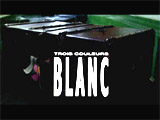

Trois Couleurs: Blanc (1994, Fr./Pol./Switz.) (aka Three Colors: White), 91 minutes, D: Krzysztof Kieslowski
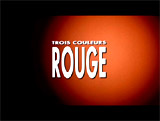

Trois Couleurs: Red (1994, Fr/Pol./Switz.) (aka Three Colors: Red), 99 minutes, D: Krzysztof Kieslowski
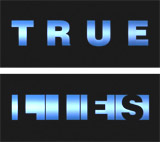

True Lies (1994), 141 minutes, D: James Cameron